Killer Coke Update | June 26, 2008
Stony Brook Dumps Coke; Stop Obama Mistake; Coke's Nuclear Tie
Contents of the Newsletter
- Colossal Victory: SUNY Stony Brook 50th university to dump Coke
- Coke Director Sam Nunn: A Bad Choice for Obama
- Coke & Nukes: Support Efforts to Shut Down Indian Point Nuclear Reactors Linked to Coca-Cola
1. Stony Brook University, State University of New York (SUNY), removes all Coke from campus
Congratulations to the Social Justice Alliance, students and faculty of SUNY Stony Brook for a hard-fought campaign and victory to remove The Coca-Cola Company's presence on campus, eliminating all Coke machines, Coke fountain service and Coke advertising. We want to thank all those who worked so hard to bring in this victory and the important role played by Students Dan Woulfin, Anita Halasz and Victor Rosado and Prof. Michael Zweig.
This was a colossal victory not only because Coke was kicked off this large campus of more than 25,000 students and faculty with which Coke had an exclusive 10-year contract, but because it can help pave the way for other successful campaigns at SUNY to make this very large state system Coke-free. This victory made SUNY Stony Brook the 50th college to kick Coke off campus.
The following email was forwarded to our campaign by a SUNY Stony Brook student:
"From: Angela Agnello, Director of Marketing & Communications
"Date: Wed, Jun 18, 2008 at 10:27 PM
"Subject: Stony Brook University is pleased to announce a ten year partnership with Pepsi for the exclusive beverage pouring rights at the University.
"To All Students:
"Stony Brook University is pleased to announce a ten year partnership with Pepsi for the exclusive beverage pouring rights at the University. This agreement will provide the campus with an exciting variety of beverages as well as significant support for student scholarships.
"The awarding of this contract was the result of an extensive, formal bidding process that included a committee of campus professional staff, undergraduate and graduate students. Pepsi's bid was rated highest in a variety of criteria that included both financial return and other important issues to the University and the campus community."
Read 'Stony Brook Kicks Coke Off Campus,' June 19, 2008
"The Social Justice Alliance (SJA) started the Coca-Cola Campaign on Stony Brook Campus in Fall of 2005, where they began educating students on the corporation's human rights abuses with SINALTRAINAL, a union in Colombia. They delivered letters to the Administration, informing them of the abuses and started holding panels and discussion forums to gain the support of the student body.
"Within months, the Undergraduate Student Government passed a resolution that called on the University to remove Coca-Cola Products from campus; and before the end of the spring semester, several undergraduate and graduate clubs called on the university to do the same..."Read more
Read 'Coke vs. Pepsi: The Eternal Argument,' By Charlene Obernauer, June 19, 2008
"Okay, so we know Coke and Pepsi are both bad. They're both corporate entities that have well-documented cases of social justice abuses, both in the United States and abroad. But at Stony Brook University, we were concerned with strategy, and as a strategy, we wanted to hurt Coke's profits and image as much as possible. We never supported Pepsi, and have noted the dangers of an exclusivity contract in general..." Read more
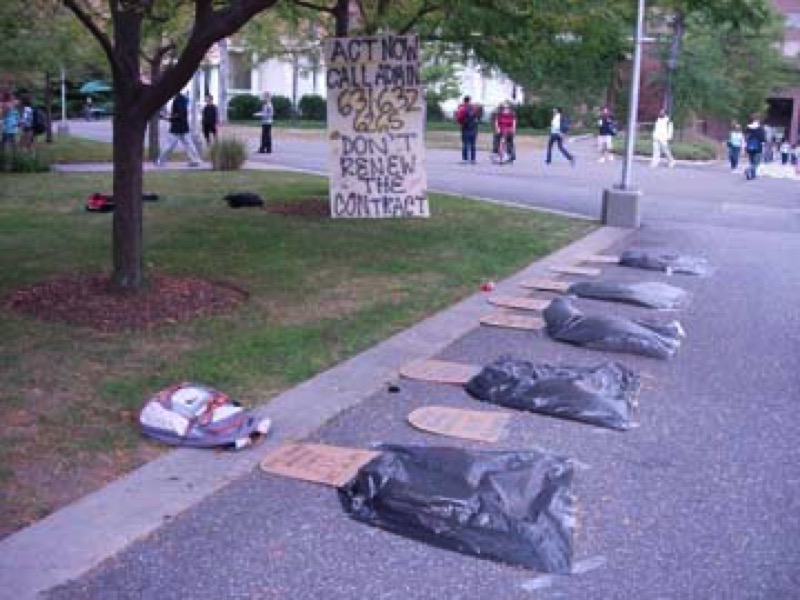
Press Release from SUNY Albany, "The SUNY-Wide Campaign To Hold Coca-Cola Accountable: SUNY Stony Brook Passes The Test On Human Rights; SUNY Albany Fails!"
Read Press Release
"As SUNY Stony Brook announced last week that it would NOT sign another contract with the Coca-Cola Company, students, faculty, and community members question UAlbany's recent decision to re-contract with Coca-Cola."
Students and faculty vow to continue the fight to remove Coke products from UAlbany when school begins in the Fall.
Archival History of the Fight to Remove Coke from SUNY Stony Brook:
2008
Letter to 250 New York State Legislators
Students and faculty at SUNY Albany and SUNY Stony Brook and the Campaign to Stop Killer Coke sent a joint letter to all 250 New York State legislators, members of congress and the executive branch of the state government:
Read Letter
2007
The Statesman (Stony Brook University), "Coca Cola, Pepsi, or Cadbury-Schweppes: New Contract Bid to Run Through June 2008," By Adam Peck, December 13, 2007
Read Article
The Statesman (Stony Brook University), "A New Contract With an Old Problem," By The Statesman Editorial Board, December 13, 2007
Read Editorial
The Stony Brook Statesman, "Coca Cola Defends Allegations: The Coca Cola Conundrum, November 15, 2007
Read Coke's arguments
The Stony Brook Statesman, "Students Speak Out Against Coca Cola'a Human Rights Violations: The Coca Cola Conundrum," November 15, 2007
Read Stony Brook students response
Correction: In the Students' response is an error which is in the process of being corrected by the Statesman. It reads: "Students from at least 45 colleges and universities, including Rutgers and New York University, have spearheaded movements against Coke and over 30 have kicked Coke off their campuses." It should state: "Students from some 200 colleges and universities, including Rutgers and New York University, have spearheaded movements against Coke and over 45 have kicked Coke off their campuses."
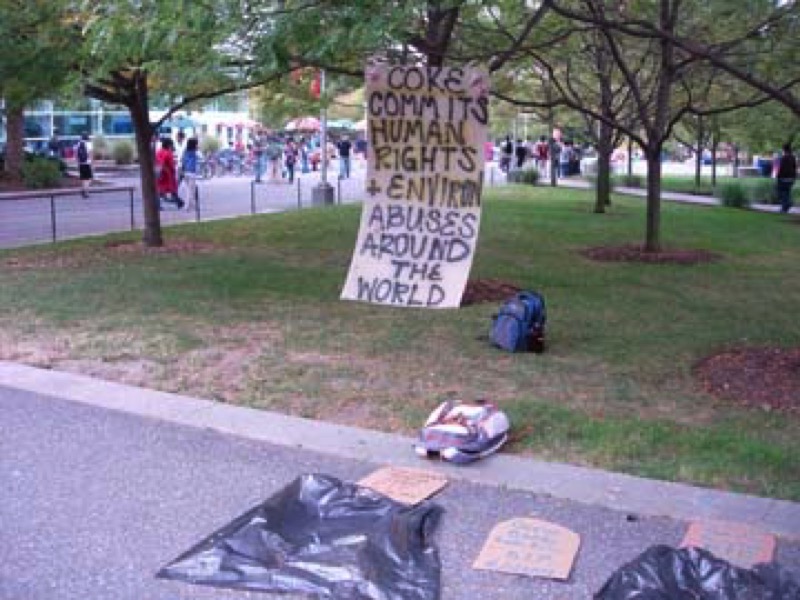
GSEU Rank and File, "GSEU Successfully Lobbies GSO Senate to Make the Ethical Beverage Choice," October 23, 2007
Read Article
"Wednesday, October 17, 2007 (Stony Brook) & Members of the Graduate Student Employees Union (Stony Brook) successfully advocated for a motion of the Graduate Student Organization (GSO) Senate to ban Coca Cola from its meetings joining GSEU and United University Professionals, the faculty/staff union at Stony Brook, the GSO Senate as the third representative body to ban Coca Cola from their meetings at Stony Brook University."
the stony brook Statesman, "New Tactics by The Coke Campaign: Phone Calls To Administration Begin," By Adam Peck, October 8, 2007
Read Article
"The campus campaign against Coca Cola has begun a new tactic that has proven to be successful on other college campuses. On Wednesday Oct. 3, the Social Justice Alliance lined the walkway between the Student Activities Center and the zebra path and encouraged students to call the office of the president directly and demand that Coca Cola be kicked off campus. Campaign leader Anita Halasz estimated that roughly 20 students called on the spot and several more people to call after the event took place."
Read Press Release
the stony brook Statesman (New York), "The Coke Campaign Enters the Home Stretch," By Adam Peck, September 6, 2007
Read Article
"The Social Justice Alliance's campaign against the Coca-Cola Company ended with a bang last semester, and organizers are already gearing up for what will be the final academic year before Stony Brook University's 10 year contract expires in June 2008.
United University Professions (UUP) Delegate Assembly votes to boycott Coke, April 20, 2007
Read UUP Resolution
"...BE IT RESOLVED that the UUP Delegate Assembly recommends to the statewide UUP Executive Board that UUP not serve Coca-Cola products at its events, meetings, conferences, and delegate assemblies,"
From the Stop Killer Coke newsletter, June 5, 2007
"The Stony Brook University chapter of United University Professions following the lead of its New York statewide parent union, passed a resolution which bans Coke products from its meetings and facilities. This brings more support to the campaign end the university's relationship with Coke.
"The Executive Board of the UUP chapter at Stony Brook University (AFT 2190) passed the following resolution at its May 16, 2007 regular meeting:
"A motion (Feliciano/Gardaphe) to avoid Coke products as was noted at the Spring DA at UUP functions carried.
"This implements at the chapter (campus) level the resolution passed at the union's statewide Delegate Assembly in April calling for a boycott of all Coca-Cola products at UUP statewide functions, which also called on individual campus chapters to carry the ban to each campus in the SUNY system. These motions had immediate consequences since UUP had regularly served Coca-Cola products at its meetings.
"UUP represents 32,000 faculty and professional staff on 29 campuses of the State University of New York."
The Stony Brook Statesman, "Killer Coke Campaign Looks to Expiring Contract in 2008, By Adam Peck, May 5, 2007
Read Article
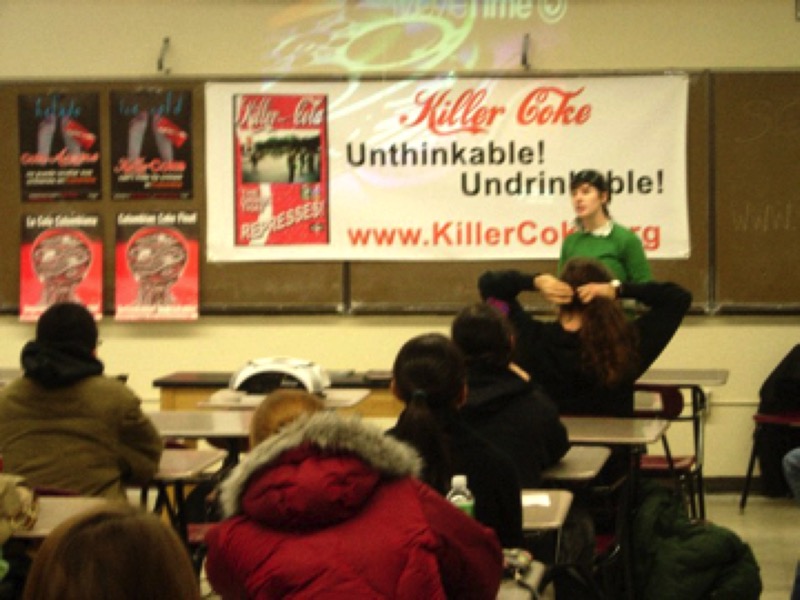
Anita Halasc of the Social Justice Alliance
From the Stop Killer Coke Newsletter, May 14, 2007:
"Stony Brook's ten-year exclusive contract with Coca-Cola is coming up for renewal, but a growing student movement on the campus of 25,000 students and faculty, is determined to end the campus's relationship with Coke. On May 9th, five student leaders in the campaign were ready to meet with a large group from the administration and six representatives from Coca-Cola. The students asked Campaign to Stop Killer Coke Director Ray Rogers to attend in the event that Coke raised issues that they needed advice on in order to respond.
"When Ray arrived at the administration building, he was brought into a room in which Karol Gray, Vice President of Administration and Finance and chair of the meeting, was waiting with the students who would attend. Ms. Gray had obviously had been misled by Coke representatives who had apparently pressured and convinced her that Ray should not be allowed to speak at all. So Ray was informed that he could attend, but not speak.
"Confident that the students were well-prepared, Ray agreed to the format, but said he felt he should receive the same opportunity to meet with key administrators as they provided for Coke. Ms. Gray first disagreed, but after Ray and the students said that they had a problem with that, she agreed that Ray would get a meeting. The students did an excellent job dealing with the six representatives from Coca-Cola and its largest bottler, Coca-Cola Enterprises.
"After the meeting, Ms. Gray asked Ray if he could come back later in the afternoon to meet with a group of administrators. That meeting took place. Ms. Gray, who recently became the new VP of Administration and Finance, made it clear when she told Ray that SUNY Stony Brook would not do business with an unethical business partner."
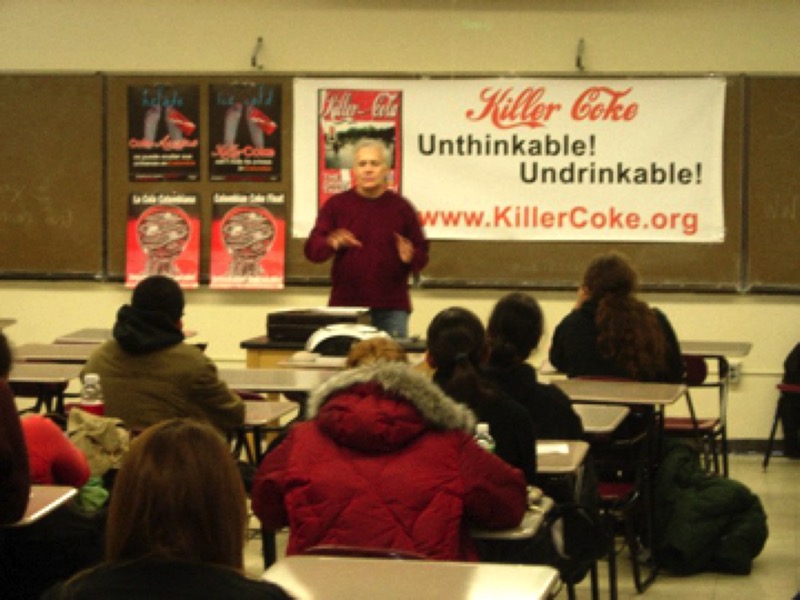
Ray Rogers of Campaign to Stop Killer Coke
The Stony Brook Statesman, "SJA Gains Momentum Against Coke: Student Voices Heard, By Adam Peck, April 23, 2007
Read Article
Stony Brook Independent, "Coke Campaigners Focusing on Next Contract," By By George Agathos, February 20, 2007
Read Article
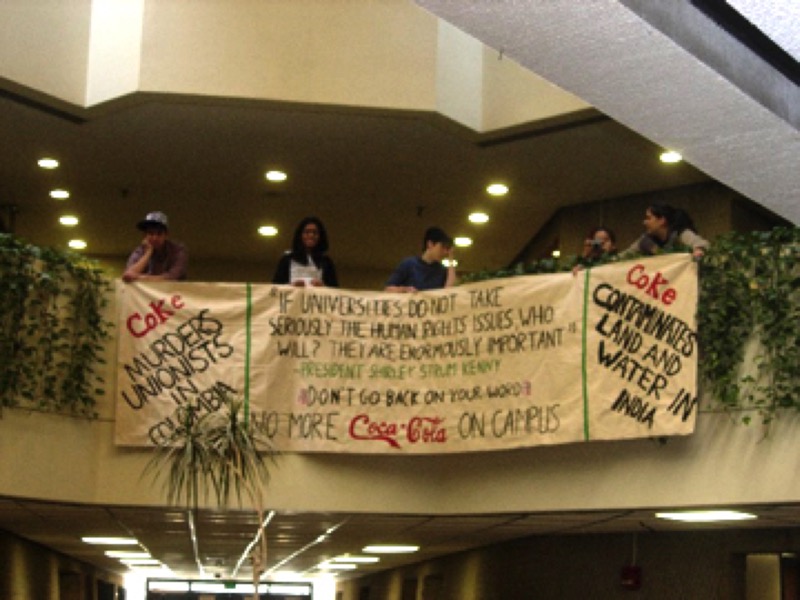
2. Coke Director Sam Nunn: A Bad Choice for Obama
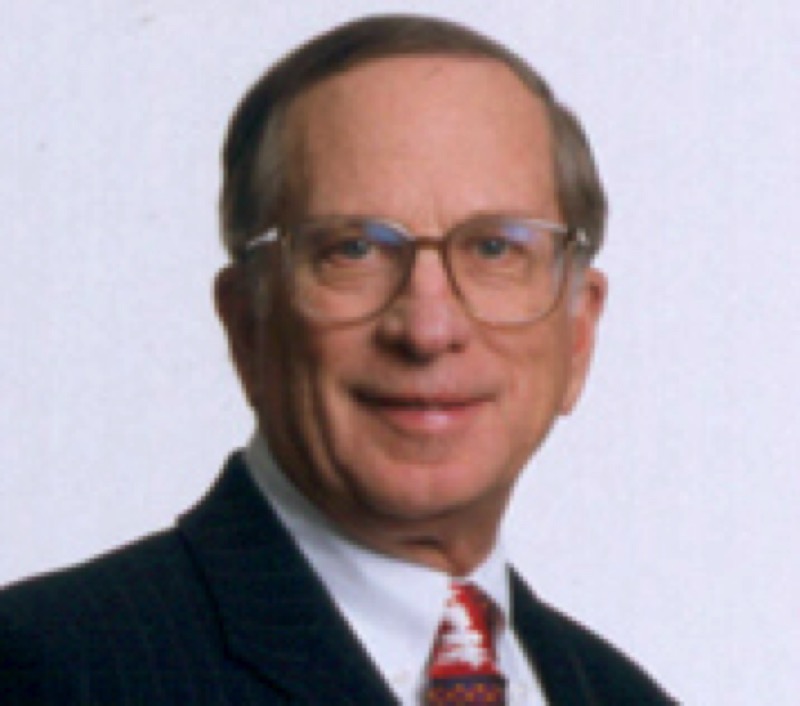
Coca-Cola Board Member Sam Nunn
The media has suggested on numerous occasions that Senator Barack Obama might choose former Sen. Sam Nunn (D-Ga.) as his running mate. Sam Nunn's name was mentioned for VP fairly recently by Jimmy Carter as he endorsed Obama for president.
Associated Press reported on June 19: "Rep. Carolyn Cheeks Kilpatrick, D-Mich., who leads the Congressional Black Caucus, said members of her caucus asked her to forward the names of Edwards and Nunn when she met Wednesday with Obama's vice presidential search team. The vetting team, Caroline Kennedy and Eric Holder, indicated the two were on the list."
It would be a grave mistake for Obama to choose Nunn as Vice President! Nunn's values are contradictory to those expressed by Sen. Obama.
Sam Nunn sits on the boards of four of the most abusive corporations in the world & The Coca-Cola Co., Chevron, General Electric and Dell Computers. All four have shown scant regard for human rights, the environment and/or the labor movement of the countries in which they operate. Yet Nunn has been silent about the abuses of his corporate bedfellows and, of course, is very well compensated as a board member.
The Coca-Cola Co. (Board Member since 1997) is involved in labor and human rights abuses. For example, lawsuits charge that Coke's bottlers in Colombia are involved in the systematic intimidation, kidnapping, torture and murder of union leaders (KillerCoke.org). Coca-Cola is also involved in environmental abuses worldwide including India, Mexico and El Salvador as well as benefiting from the use of hazardous child labor in El Salvador.
The Company also has a history of racial discrimination, fraudulent business practices, tax avoidance and corporate welfare schemes. Multinational Monitor named The Coca-Cola Company in their list of the ten worst corporations of 2004. Does Obama need a top policymaker of a company that has been kicked off at least 50 college and university campuses because of its widespread labor, human rights and environmental abuses?
Chevron, (Board Member since 1997) formerly Chevron Texaco, has been accused of abuses around the world (Chevron Texaco: Ecuador's Black Plague), the most infamous are those committed against the indigenous people of Ecuador where there are still outstanding lawsuits against the company. There is an international campaign calling for Chevron to "Clean Up, Pay Up, Get Out and Stay Out of Ecuador" because of the massive health complications and environmental damage caused by its ruthless exploitation of the land.
Chevron has been accused by villagers in the murders of protesters in Nigeria in 1998 and widespread environmental damage (Bowoto on Chevron in Nigeria.). On May 28, 2008, Larry Bowoto, one of the injured protesters, stated on the 10th anniversary of these killings: "Nigerian security forces hired, paid for and 'closely supervised' by Chevron opened fire on peaceful demonstrators?killing two men and injuring two more. I was shot by soldiers bought and paid for by Chevron. On May 28, 1998, I was on a Chevron oil barge in the Niger Delta. One hundred other villagers were with me. We were unarmed. We were there to protest the loss of our fish, our clean drinking water and our food trees, all of which are taken from us when Chevron pollutes and destroys our homeland?"
Multinational Monitor named Chevron in their list of the ten worst corporations of 1998. Does Obama need a top policymaker of yet another ruthless oil company after eight years of ExxonMobil in the Bush White House? Don't we need to rid the White House of oil men?
General Electric (Board Member since 1997) "has a lengthy record of criminal, civil, political and ethical transgressions, some of them shocking in disregard for the integrity of human beings," according to CorpWatch. GE, a major military contractor profiting from war, pled guilty to defrauding the defense department, paying "one of the largest defense contracting fines ever (Read article in Multinational Monitor). Nunn served as chairman of the Senate Armed Services Committee in the Senate and immediately became a director of GE when leaving the Senate in 1997. Does Obama need a top policymaker of the war profiteers?
Dell Computers (Board Member since 1999) has come under criticism for alleged labor violationsin factories producing their computers in China, including wages below the legal minimum, with workers reportedly earning $50 a month, routine work shifts of 15 hours, and poor and unsafe working conditions. Does Obama need a top policymaker profiting from sweatshops?
Sam Nunn joined these boards shortly after leaving the Senate, cashing in on his political influence, and remains on all these boards today. At no time, has Nunn supported shareholder resolutions to end these corporate abuses described above. Nunn, as Obama's running mate, however, would be a signal that Obama was turning a blind eye to the worst of Corporate America.
King & Spalding: Sam Nunn is a retired partner at the Atlanta law firm King & Spalding, a notoriously anti-union law firm, and continues to have an office and an email address there. Nunn became a partner in 1997 shortly after he left the Senate. King & Spalding's website describes their "Traditional Labor Practice":
"?We counsel non-union clients on how to remain union free, and we represent clients in union organizing campaigns and unfair labor practice cases. We have also advised clients with respect to decertifying incumbent labor unions, and have had a number of successful decertifications. We often represent clients in collective bargaining, advise clients on contract interpretation issues, and represent clients in arbitration proceedings pursuant to their collective bargaining agreements. We also actively work with clients facing work stoppages, including training management employees, obtaining injunctive relief where appropriate, and advising clients on replacement of striking workers?"
Under "Preventive Advice and Training" King & Spalding states: "We also conduct training for all levels of employees from executives to staff. These training sessions include: The Manager's and Supervisor's role in Maintaining Union Free Status?"
Some of the clients that King & Spalding have represented include Brown & Williamson Tobacco Corp., The Coca-Cola Co., Chevron, Dow Chemical, ExxonMobil Corp, General Electric Capital Corp., General Electric Co., General Motors Corp., GlaxoSmithKline, Lockheed Martin Corp, SunTrust Banks, Inc. and Turner Broadcasting System.
It should be noted that in 1993 Nunn was a leader of the Senate's drive to keep openly gay people out of the military by taking the press on tours of showers and submarine quarters and firing two staff members who were gay. Although he now supports a review of the "Don't Ask, Don't Tell" policy, he still takes no position on the issue.
And finally, The Coca-Cola Company and General Electric are contributors to the Carter Center. Coke has donated more than $1 million and the Center has, in turn, appointed a Coke executive to its Board of Councilors. There is prima facie conflict of interest in Carter's recommendation of Nunn for VP.
A decision by the Obama campaign to run Nunn for VP would be an indication that his campaign does not take labor, human rights and environmental issues seriously.
3. Coke & Nukes: Support Efforts to Shut Down Indian Point Nuclear Reactors Linked to Coca-Cola
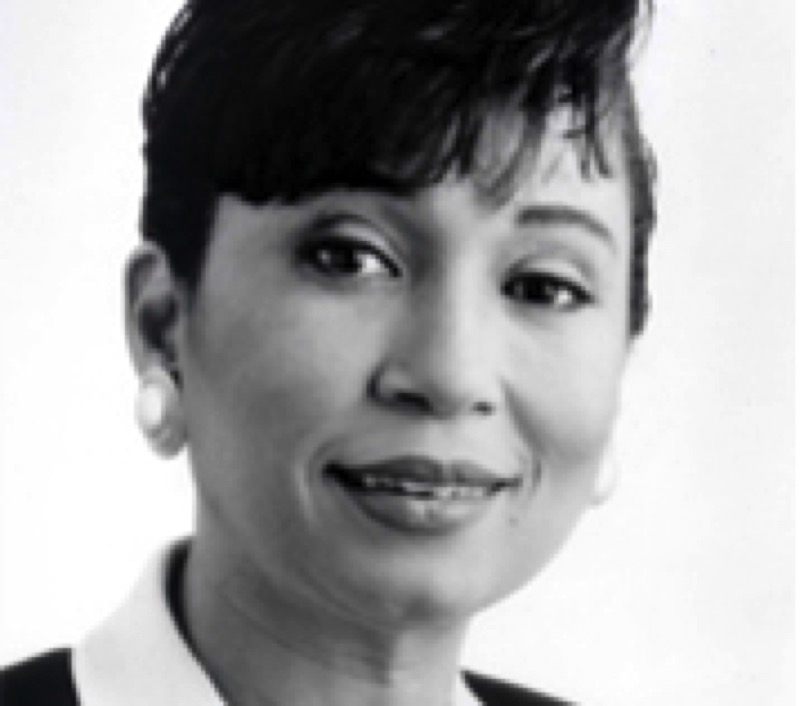
Coca-Cola Board Member Alexis Herman
Alexis Herman, a top policymaker and director of the The Coca-Cola Company is also a director and top policymaker of Entergy, which runs the Indian Point nuclear power reactors north of New York City. Out of concern for safety and pollution matters related to the reactors, New Yorkers have been attempting to shut down these reactors.
The Indian Point Safe Energy Coalition (IPSEC) is hosting the below fundraiser on Monday June 30 in New York City. If you're in the area, please consider attending; but regardless perhaps you could make a donation to this grassroots effort. Furthermore, call Coke at 1-800-GET-COKE (1-800-438-2653) and tell them that you are concerned that one of their directors also serves as a director of Entergy, in addition to the multitude of human rights and environmental abuses perpetrated by Coca-Cola. For more information see www.KillerCoke.org.
Twenty million people live within 50 miles of Indian Point, in Buchanan NY, which has been routinely releasing forms of radioactive waste into our air and water. Within its vicinity, there are levels of Strontium 90 in the teeth of the children. There is not a feasible emergency evacuation plan in the event of a catastrophe caused by human error, aging infrastructure or terrorism. The nearby watershed is the source of drinking water for New York City. Efficient alternative energy options can supply our electricity needs.
BENEFIT TO SHUT DOWN INDIAN POINT NUCLEAR POWER PLANT
Monday, JUNE 30, 2008
LINCOLN CENTER, NYC
The Indian Point nuclear reactors must NOT be re-licensed.
You are invited to join us for our urgent fundraising event on Monday, June 30th from 6:30 to 10:30 p.m. at the Walter Reade Theater in Lincoln Center, 165 West 65th Street, between Broadway and Amsterdam Avenue in Manhattan.
Our event will feature the documentary on Indian Point, Nowhere to Run and the award-winning film Woven Ways, which exposes the impacts of uranium mining on the Navajo people.
We must raise $100,000 to cover the expenses associated with the litigation and the Interveners' actions to oppose a 20 year extension of Entergy's Indian Point nuclear facilities' operating licenses. The Interveners are PHASE, RCCA, Sierra Club, WESTCAN and Assemblyman Richard Brodsky. This might be the first successful opposition to a re-licensing of a nuclear plant in US history. (We are also working with Clearwater, Riverkeeper and the NY State Attorney General.)
This event is hosted by the Sierra Club NYC Group and is sponsored by the Environmental Justice Committee for the National Lawyers Guild, the Indigenous Environmental Network, NY Environmental Law and Justice Project, Physicians for Social Responsibility NYC, author/activist Harvey Wasserman, and the Indian Point Safe Energy Coalition (IPSEC), which is a coalition of environmental, health and public policy organizations founded in 2001 to address the vulnerabilities of the nuclear reactors at Indian Point. Supporters include Christie Brinkley and Aidan Quinn (other sponsors and supporters to be announced).
To contact the event organizers, email june30benefit@yahoo.com>
For more information on nuclear power go to: www.nirs.org, www.nukebusters.org
Click Here for Tickets and Donations
www.ipsecinfo.org/june_30_fundraiser.htm
or go to www.ipsecinfo.org
Your contributions for tickets and donations are tax-deductible.
The suggested contribution for tickets is $25.
If you would like to make a donation, we will greatly appreciate your support.











